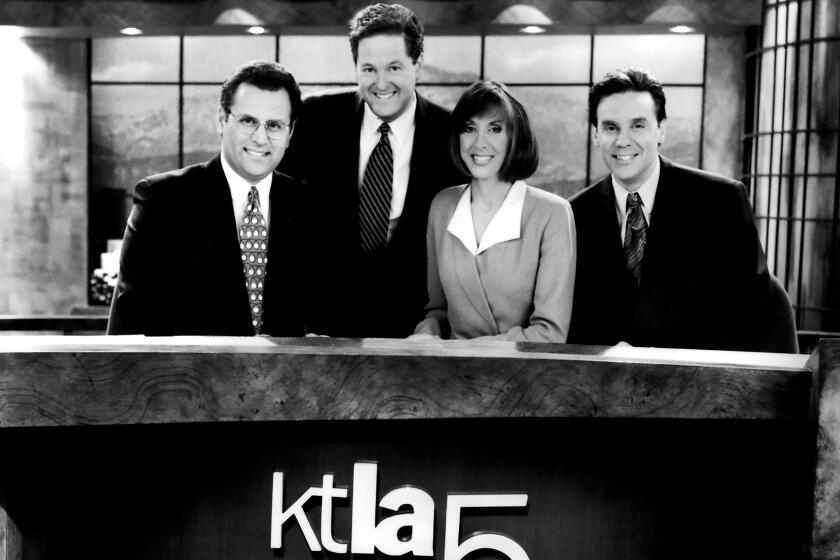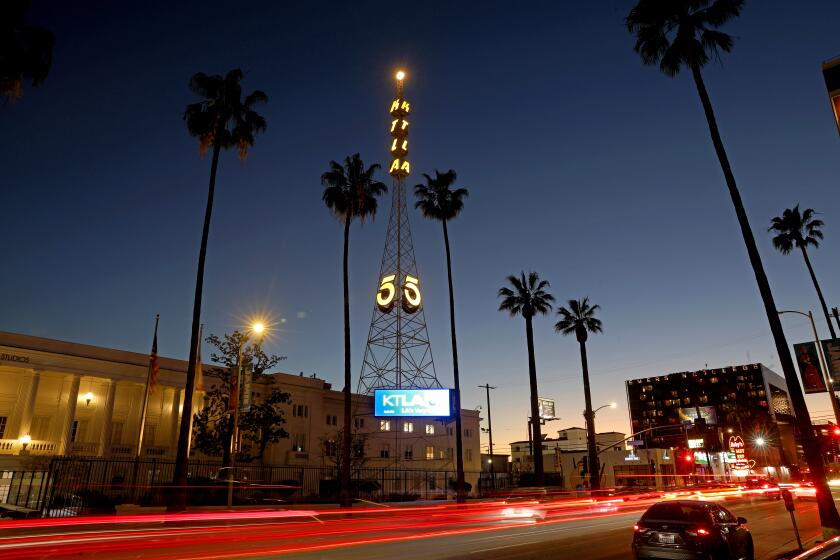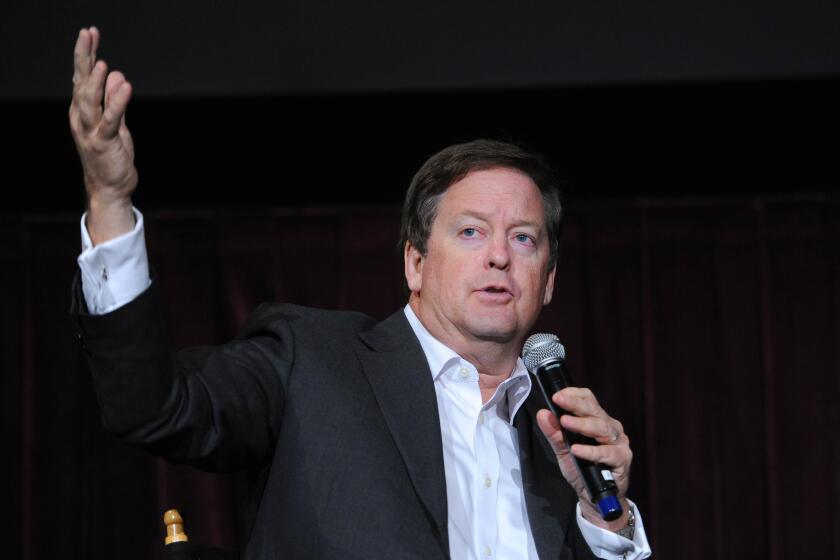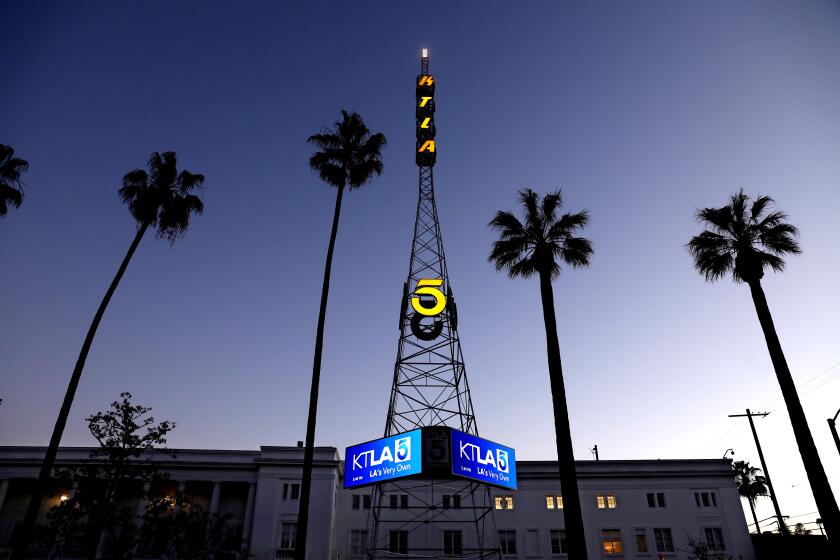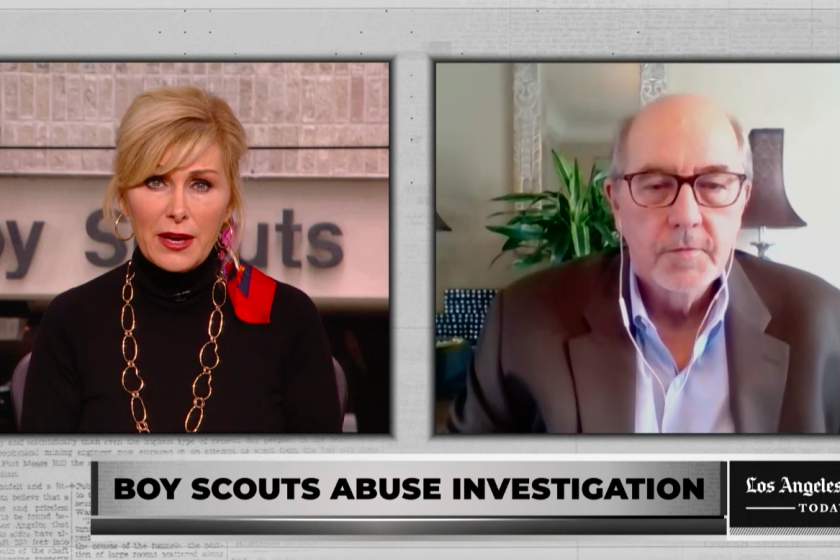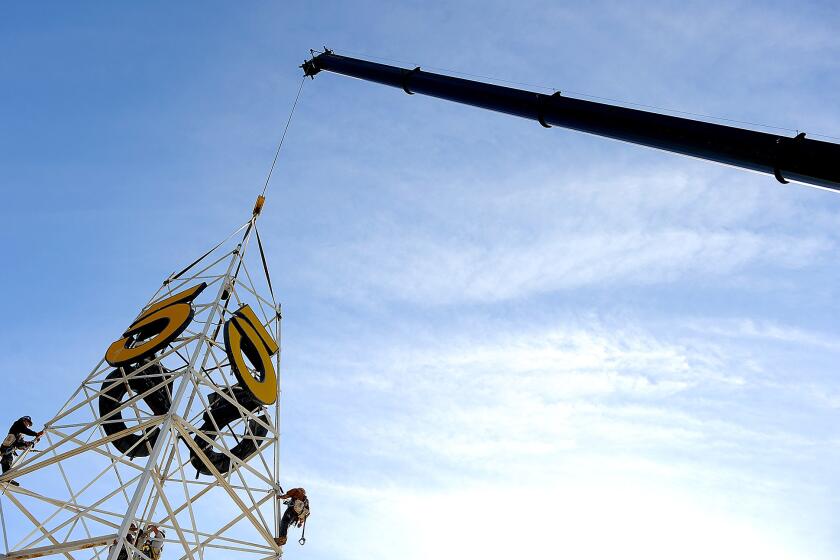Sam Rubin, KTLA journalist and longtime entertainment anchor, dies at 64
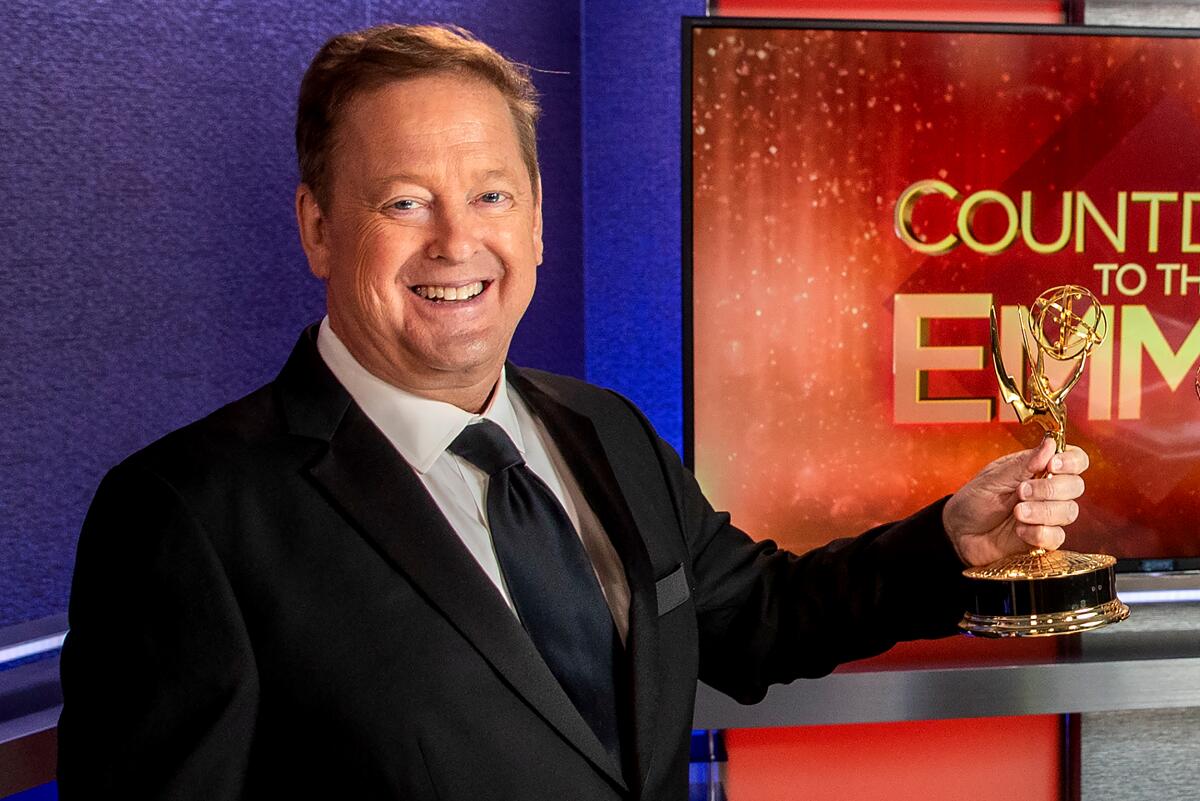
- Share via
Sam Rubin, a veteran journalist who anchored KTLA’s entertainment coverage for more than 30 years, died Friday in Los Angeles. He was 64.
KTLA news anchor Frank Buckley confirmed Rubin’s death early Friday afternoon. Fighting back tears as he announced the news on the air, Buckley called his colleague’s death “shocking” and “hard to comprehend in the moment.”
“Quite simply, Sam was KTLA,” he said. “The newsroom is in tears right now.”
Sam Rubin helped pioneer early morning TV broadcasts at Channel 5, and his coverage of Hollywood tended to be largely positive.
Rubin was on the air Thursday, interviewing actor Jane Seymour, but had called in sick Friday, with film critic Scott Mantz filling in. The channel did not share additional details about Rubin’s death, but a source familiar with the circumstances told The Times that he had cardiac arrest at his West Valley home Friday morning and was taken to a hospital, where he was pronounced dead.
“Sam was a giant in the local news industry and the entertainment world, and a fixture of Los Angeles morning television for decades,” KTLA said of Rubin in a statement shared on social media. “His laugh, charm and caring personality touched all who knew him.”
Mantz wrote on social media that he was in “absolute shock” to learn about his colleague’s unexpected death. “I always called him ‘The Godfather of Entertainment News,’ and that was true. An absolute legend [and] a generous person.”
Rubin was born Feb. 16, 1960, in San Diego, went to high school in L.A. and attended Occidental College, where he was awarded a degree in American studies and rhetoric.
He joined KTLA’s “Morning News” program in 1991, earning a reputation for his disarming interviews and warm personality on and off the air. According to founding co-anchor Carlos Amezcua, Rubin contributed a sense of Los Angeles authenticity that the fledgling show needed.
KTLA-TV Channel 5 celebrates its 75th anniversary this year after playing a crucial role in Los Angeles history, setting trends that revolutionized TV news.
Amezcua, 70, described Rubin as “the connective tissue” that helped him, weather forecaster Mark Kriski and co-anchor Barbara Beck reach their intended audience.
“What can always be said about Sam is that he helped the ‘KTLA Morning News’ connect to Los Angeles as a native Angeleno who loved L.A. and knew the city better than anyone else on set,” said Amezcua, who joined KTLA the same year as Rubin. “We had L.A. in our call letters, and Sam always said that we knew L.A. and L.A. knew us.”
What impressed him most was Rubin’s depth of knowledge. “He knew Hollywood and what was important to the entertainment industry,” said Amezcua, co-founder of digital streaming service Beond TV.
Carlos Amezcua, former co-anchor at ‘KTLA Morning News,’ recalls his colleague and friend Sam Rubin as someone who was ‘equal parts mischievous and solid journalist.’
Over time, Amezcua said, viewers and even some within the industry began to regard Rubin himself as a celebrity.
“We used to make fun of him all the time about that,” Amezcua said. “I used to tell him, ‘You’re as big as the celebrities you’re interviewing.’ He would just laugh and say, ‘C’mon,’ but I think deep down he knew that.”
But that level of local fame sometimes found Rubin in situations that pushed the boundaries of journalistic ethics, as in 1992, when he accepted a bit part on “The Jackie Thomas Show” just weeks after helping publicize the sitcom by interviewing star Tom Arnold and his then-wife, Roseanne Barr, between the sheets in their bed.
KNBC announces that anchor Lynette Romero, who abruptly left crosstown rival KTLA, will join its early newscast, ‘Today in L.A.,’ on Oct. 10.
“I can understand the objection to it, but I have been critical of the Arnolds in the past and I will be in future,” Rubin told The Times that December. “And it’s just a two-line walk-on. I’m not making big money for this. I could make a lot more selling a nasty article on the Arnolds somewhere.”
For his work as Reporter No. 1 on the sitcom, Rubin said he was paid scale — then $466 a day.
Beloved by his colleagues and many others in Tinseltown, Rubin also had a history with The Times that included several contentious back-and-forths between him and various writers for the newspaper.
Rubin wrote a piece for The Times in February 1999, firing back at Brian Lowry, who was then a TV columnist for the outlet and is now a senior entertainment writer for CNN. In the buildup to that year’s Academy Awards, Lowry had listed Rubin as one of a new breed of local TV reporters “that places so much emphasis on entertaining, the reporting has become a bit of a joke.”
“Brian Lowry displays such vitriol and rancor in his recent diatribe against me and the expansion of broadcast entertainment journalism that perhaps he just needs a little lesson in how those of us who are successful in this line of work actually do our jobs,” Rubin wrote in his response. “I have never attended ‘Clown College,’ but since Mr. Lowry insists I am the P.T. Barnum of my generation, here are a few tips.”
Rubin went on to advise Lowry to find a “genuine appreciation” for his audience and, most importantly, learn “the importance of tone.”
“I have to run now and put on my clown suit; there’s another kid’s birthday party I will be entertaining at,” Rubin said in closing. “My clown costume, of course, is hanging in my closet, right below the shelf containing my three local Emmy Awards.”
Longtime anchor Lynette Romero’s abrupt exit from KTLA kicked off a hectic week that ended with the firing of her former co-anchor, Mark Mester.
Two years later, again around Oscars time, The Times’ TV critic Howard Rosenberg wrote a story about competition between morning news shows in which he mentioned “weathercaster Mark Kriski, who seems to live for being the kind of fun guy you’d see hanging from a chandelier with a lampshade on his head at a cocktail party. And also … the show’s beanbag with lips, show-biz groupie Sam Rubin.”
Rosenberg, now retired, noted that Rubin and Kriski had torn up a copy of The Times containing a story about the battle between KTLA and rival KTTV, home of No. 2 morning show “Good Day L.A.” They didn’t like that the story reported that while KTLA was No. 1 in the morning, its overall audience was down from the year before.
Still, in the same column, Rosenberg called Rubin “someone who has become the one thing, more than any other, that ‘Good Day L.A.’ is unable to match.”
In return, Rubin penned a story in which he proposed a job swap with Rosenberg.
“I can envision my week as the television critic for the Los Angeles Times. ‘Honey, could you adjust the La-Z-Boy? This massage feature isn’t working. And sweetie, could you pop in another video from some obscure cable channel? Now, let me see, where in the world am I going to find the time to write the occasional review and my two scheduled columns for the entire week?’” Rubin wrote.
“Howard is going to be in for a real change of pace. He can use my alarm clock — the one that is set for 4 a.m. Howard can choose what stories to report on, write every word of his report himself, order the videotape he needs, select all the graphics, get made up and come up with one or two gags that poke fun at his bosses at the L.A. Times. Of course, he will have to do this for five days in a row.”
Former Times investigative reporter Kim Christensen, who died Monday, was known for his incisive reporting and equally keen wit.
Away from the TV cameras and media sparring, Rubin’s life revolved around his family, former colleague Amezcua said.
“I have five children and they all knew Sam and his family, and Sam was just so generous with his time,” Amezcua said. “He was a good family man and they loved him. We all loved him.”
Former news director Jason Ball, who worked at KTLA from 2008 to 2021 before retiring, called Rubin “bigger than life” and “a lion” who “deserves to be memorialized.”
Ball said he occasionally butted heads with Rubin on show ideas but didn’t mind it when his colleague “pushed him outside his comfort zone.”
“Sometimes you didn’t know what he was going to do, which could be a challenge for me,” Ball said. “But I always knew he had the show’s heart in mind, and I don’t really know how KTLA is going to function without him.”
The iconic KTLA-5 tower, which stood watch at the corner of Sunset Boulevard and Van Ness Street for more than 60 years, was dismantled Monday morning, piece by piece, so that it could be restored and relocated.
As the face of KTLA’s entertainment coverage, Rubin won over Angeleno audiences, including celebrity viewers Tom Hanks and Henry Winkler.
“He made you feel special every single time,” Winkler said in a call to KTLA on Friday. “He made every human being feel so special and got them to open up like a flower.”
He also had a way of turning chaff into wheat. “There are a lot of stupid, boring celebrities out there,” “Alias” actor Greg Grunberg said via phone on the broadcast Friday. “And man, did he make them all seem interesting.”
The San Diego-born reporter also brought his industry knowledge to platforms overseas. He regularly appeared on BBC Television and contributed frequently to Australia’s Triple M radio and Channel 9 Television, according to KTLA’s website.
The author of biographies on former First Lady Jacqueline Onassis and “Rosemary’s Baby” star Mia Farrow, Rubin won multiple local Emmy Awards for his entertainment coverage. He also received a Golden Mike Award for entertainment reporting and an Associated Press Television and Radio prize for his work. Other accolades included honors from the Southern California Broadcasters Assn., the Los Angeles Press Club and the National Hispanic Media Coalition.
“He was born to be a broadcaster. He was the best broadcaster that there is,” Eric Spillman, KTLA reporter and Rubin’s longtime colleague, said during Friday’s broadcast.
Outside of his on-air work, Rubin was a founding member of the Broadcast Film Critics Assn., owned a self-named television production company and supported several nonprofits.
Rubin is survived by his wife, Leslie Gale Shuman, and four children.
More to Read
The complete guide to home viewing
Get Screen Gab for everything about the TV shows and streaming movies everyone’s talking about.
You may occasionally receive promotional content from the Los Angeles Times.
